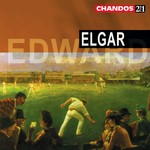
Elgar: 'Enigma' Variations / Pomp and Circumstance Marches / Three Bavarian Dances / etc
 $40.00
Out of Stock
$40.00
Out of Stock6+ weeks add to cart
EDWARD ELGAR
Elgar: 'Enigma' Variations / Pomp and Circumstance Marches / Three Bavarian Dances / etc
Leon Goossens (oboe) / Bournemouth Sinfonietta, Norman Del Mar, George Hurst / Royal Scottish National Orchestra, Sir Alexander Gibson
[ Chandos 241 / 2 CD ]
Release Date: Monday 1 February 1999
This item is currently out of stock. It may take 6 or more weeks to obtain from when you place your order as this is a specialist product.
"A great bargain and highly recommended."
(MusicWeb)
"Sir Alexander Gibson conducted some fine performances of Elgar for Chandos including a fine album that comprised: Froissart; Cockaigne; In the South and Overture in D minor. His recording that adventurously coupled The Spirit of England with the Coronation Ode was also admired.
Gibson's Enigma Variations, of course, faces stiff opposition from many world-famous orchestras and conductors yet this performance compares favourably with many. The central variations: the two very feminine ones, a tender W.N. (Winifred Norbury) and a dainty 'Dorabella' which bracket a noble Nimrod, all shine; so, too, do G.R.S. with a very vivid portrait of Dan, the bulldog; and a thrilling if a bit wayward but appealing E.D.U. grand climax. - the sound is a little over-reverberant but it adds a nice spacious feeling to the proceedings.
Gibson's Pomp and Circumstance Marches face strong competition too. Yet I cannot ever remember hearing a more convincing performance of No. 2 - full of bravado and swagger and No. 3 is much stronger than usual too. These are the lesser appreciated marches of the set. The more famous No. 1 (Land of Hope and Glory) and No. 4 are well up to the standard of the competition but I must confess that I was disappointed with No. 5 which I personally regard very highly. The important rhythmic accents seem blurred in comparison with rival readings - Boult, for me, reigns supreme here.
The majority of the shorter pieces first appeared as a Chandos Production conducted by Norman Del Mar on the RCA label in 1976 (RCA LRL1 5133) before Chandos became a separate entity. The producer was the splendid Brian Culverhouse and the sound engineer Brian Couzens. The remaining items, conducted by George Hurst, again as a Chandos Production had appeared, in 1975, on the Polydor label
It would be a mistake to dismiss Elgar's shorter, lighter pieces as salon pieces of no real consequence for they were composed with the same dedication and craftsmanship as the larger more serious works and are worthy of similar regard. Both Del Mar and Hurst delivered sympathetic and committed performances of these little gems. Take Dream Children for instance, so many conductors can make the opening Andante sound dreary and dirge-like. Not Del Mar he takes due regard of the quotation at the head of the score (from Charles Lamb): 'We are only what might have been', and he suffuses the music with a warm sense of yearning and regret.
Most of these pieces are too well-known to need comment. Soliloquy is the least well-known piece. This was written as part of a projected suite in tribute to Leon Goossens; it existed only in short score and it was eventually orchestrated by Gordon Jacob in 1967. The Woodland Interlude comes from Caractacus and was a great personal favourite of Elgar's. It featured in the recording session which Elgar supervised from his bed as he lay dying, in 1934. The Dream Interludes come from Falstaff and depict Falstaff dreaming of episodes in his youth. Beau Brummel was a play with Elgar's incidental music written in 1928 and The Spanish Lady was the projected opera that Elgar was contemplating towards the end of his life.
From the few sketches Percy Young created a Suite for Strings in 1956. The quietly rhapsodic violin writing for the hauntingly beautiful Sospiri (Sighs) was intended for W.H. 'Billy' Reed of the LSO who had given Elgar so much advice and help in the composition of his Violin Concerto.
A great bargain and highly recommended."
(MusicWeb)
Tracks:
Variations on an Original Theme 'Enigma', Op. 36
Pomp and Circumstance Marches, Op. 39 (Nos 1-5)
Chanson de matin, Op. 15 No. 2
Chanson de nuit, Op. 15 No. 1
Sérénade lyrique
Salut d'amour, Op. 12
Dream Children, Op. 43
Contrasts, Op. 10 No. 3
Soliloquy for Oboe and Orchestra
Woodland Interlude from Caractacus
Two Interludes from Falstaff
Three Bavarian Dances
Sospiri, Op. 70
Minuet from Beau Brummel
Burlesco from The Spanish Lady
Adieu
Waltz from The Starlight Express
Sursum corda, Op. 11